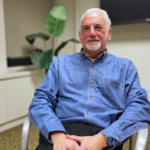
Jay is a father of two adult sons who lost his wife Judy to ovarian cancer in August 2020. He got involved with CancerCare and joined a bereavement support group.
The grief of losing a spouse is unique and complex. “You lose your best friend. You lose the person you trusted the most in your life,” Jay said. “You even lose a little of your past because you have no one to share your past with anymore.”
Jay describes feeling isolated after losing Judy. Friends would avoid talking about his experience or didn’t reach out to him at all when he thought he could count on them. “Grief is very isolating and you need to find people to speak to,” he says. “That is one of the reasons I joined the bereavement group.”
Grief can also evolve over time. For example, Mother’s Day has been different every year for Jay and his sons. They have gone out to eat or gotten coffee in the park but they always find a way to honor Judy. “We always think of Judy and we always will.”
In addition to the emotional effects of grief, Jay also experienced physical effects. “They do say it’s a great thing when you can get up and take a shower at the beginning of grief and it’s true. You’re physically tired.” He has advice for those coping with the physical effects of grief. “In bereavement group, we used to say ‘you fake it till you make it’ and that’s what you have to do.”
The emotional and physical effects of grief can come on suddenly or unexpectedly. Jay describes one of these experiences happening when he returned home one evening. “I came home and nothing was touched. Everything was the same and it was totally quiet and I realized that Judy was gone. It just hit me out of nowhere and that’s the way grief is.”
Jay emphasizes that everyone’s experience with grief is different. “I read all the books on grief which I find don’t help that much because grief is the way you want to grieve. There are no rules.” For example, those who have lost a spouse make different decisions about their wedding rings. “I had to take my wedding ring off very early on because I found it sad to see on my finger. It’s different for everyone.”
He also describes the different and unexpected ways people can cope with grief. Even though they were a Jewish family, Jay remembers that Judy bought marshmallow Peeps every year to celebrate Easter. “In my second year of grief, Easter came around and I said, I’m going to get Peeps for Judy.”
In bereavement group, he told the others about this experience and how he felt it was unexpected. “The group said you should honor her the way you want to honor her and that’s the way you’re honoring her,” Jay shared. “I felt good about it then. I didn’t feel embarrassed. I didn’t feel bad. That’s why you need to speak to people who have been through this.”
Jay has understanding, encouragement and advice for other people in similar situations. “The hurt you go through is indescribable. You have to speak to people who have gone through this because no one else understands what you go through. You have to find people like that. When you go to a bereavement group, you’re able to open up completely.”
